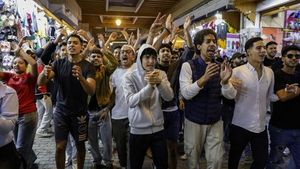The countdown to Super Bowl LXI, set for February 8, 2026, at Levi’s Stadium in Santa Clara, California, has taken a dramatic turn as the Department of Homeland Security (DHS) confirmed that Immigration and Customs Enforcement (ICE) agents will be present at the event. The announcement, made by DHS adviser and former Trump campaign manager Corey Lewandowski during an appearance on “The Benny Show” podcast, has ignited a fierce debate about the intersection of sports, entertainment, and immigration enforcement at America’s most-watched sporting spectacle.
Lewandowski’s remarks left little room for ambiguity. "There is nowhere that you can provide safe haven to people in this country illegally. Not the Super Bowl and nowhere else," he declared on October 1, 2025, emphasizing the administration’s hardline stance. "We will find you. We will apprehend you. We will put you in a detention facility, and we will deport you. So know that that is a very real situation under this administration, which is completely contrary to what it used to be." He reinforced that the directive comes straight from the president, stating, "We are going to make Americans safe."
The immediate backdrop for this enforcement surge is the NFL’s headline-making announcement that Puerto Rican superstar Bad Bunny—born Benito Antonio Martínez Ocasio—will be the first Latin solo performer to headline the Apple Music Super Bowl Halftime Show. The three-time Grammy winner, fresh off a sold-out 30-show residency in San Juan titled “No Me Quiero Ir de Aquí,” is set to bring his signature blend of reggaeton, trap, and Latin pop to the world’s biggest stage. For Bad Bunny, the moment carries deep significance. "What I’m feeling goes beyond myself. It’s for those who came before me and ran countless yards so I could come in and score a touchdown … this is for my people, my culture and our history," he said in an October 1 statement.
Yet, the gravity of Lewandowski’s enforcement pledge cannot be overstated—particularly given Bad Bunny’s own history with U.S. immigration policy. The artist, a U.S. citizen by birth in Puerto Rico, has been vocal about his concerns regarding ICE activity at large public events. In a September 2025 interview with i-D Magazine, Bad Bunny explained his decision to exclude the continental United States from his current world tour: "There was the issue of—like, fucking ICE could be outside [my concerts]. And it’s something that we were talking about and very concerned about." This fear, he noted, was not just hypothetical; it was a central factor in his tour planning, reflecting the heightened anxiety among his fanbase and the broader Latinx community.
The announcement of ICE’s presence at the Super Bowl has triggered a wave of reactions. Music industry insiders and immigrant rights advocates have condemned the move, viewing it as a direct threat to the inclusivity and celebratory spirit that the Super Bowl Halftime Show is meant to embody. Bad Bunny’s team responded succinctly on Instagram: "Music unites. Fear divides. See you at the show." This sentiment resonates with many fans who see the halftime show as more than just entertainment—it’s a platform for cultural pride and unity.
Lewandowski, meanwhile, did not hold back in his criticism of the NFL’s choice of headliner. "It’s so shameful that they’ve decided to pick somebody who just seems to hate America so much to represent them at the halftime game," he said on the podcast, suggesting that the league should have selected "great bands and entertainment people who would be bringing people together and not separating them." He added, "I don’t care if it’s a concert for Johnny Smith or Bad Bunny or anybody else. We’re going to do enforcement everywhere." The NFL has yet to respond to multiple requests for comment on the matter or to clarify what, if any, additional security measures or advisories will be issued for fans.
Despite the controversy, the commercial impact has been immediate and striking. Ticket sales for Super Bowl LXI reportedly surged by 15% in the 24 hours following the halftime show announcement. While some corners of the internet—particularly xenophobic forums—have called for boycotts, the overwhelming response has been one of anticipation for a historic performance. The Super Bowl’s audience is massive, with over 100 million viewers expected worldwide. Market research from February 2025 indicates that 68% of Super Bowl enthusiasts are white, with a median annual income of $74,000, and tickets for last year’s game exceeded $6,000, not including travel and accommodations. Data also shows that undocumented immigrants pay, on average, about $9,000 per year in taxes and earn around $55,000 annually, raising questions about the practical impact of ICE enforcement at such a costly event.
The DHS has attempted to clarify the scope of its enforcement. In a statement, the agency reminded the public, "ICE does NOT arrest or deport U.S. citizens." This point is particularly relevant given Bad Bunny’s citizenship status, but does little to assuage the concerns of fans who may have mixed-status families or are wary of heightened law enforcement visibility at the event. The memory of increased security at the 2025 Super Bowl in New Orleans—following a deadly terrorist attack in the French Quarter—looms large, and the expectation is that Santa Clara will see a similarly robust security presence.
The political overtones of this year’s halftime show are unmistakable. Lewandowski’s comments reflect not only the administration’s immigration priorities but also a broader culture war over representation at marquee American events. Bad Bunny, for his part, has not shied away from the spotlight, recently hosting the Season 51 premiere of Saturday Night Live and starring in high-profile film and television projects. His selection as halftime headliner is seen by many as a "touchdown" for Latin music and culture, even as it draws fire from conservative critics.
As the Super Bowl approaches, the stakes are high—not just for the teams on the field, but for the millions watching around the globe. Will the event become a flashpoint for immigration enforcement, or will it serve as a celebration of diversity and unity through music and sport? With California’s new no-mask and identification laws set to take effect by January 1, 2026, the landscape of public events is changing, and all eyes will be on Levi’s Stadium come February.
For now, the NFL, Bad Bunny, and their fans are pressing forward, determined to make history on the world’s biggest stage, even as a political storm brews in the background. One thing is certain: this Super Bowl halftime show will be one for the ages, no matter what unfolds.






